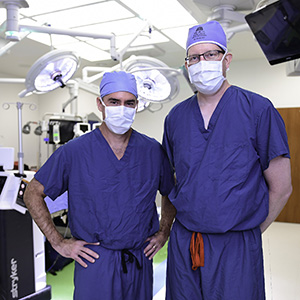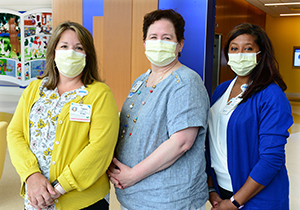We are thrilled to announce that two outstanding teams at Children’s Wisconsin have been recognized as Health Care Champions by the Milwaukee Business Journal.
Mike Mitchell, MD, pediatric cardiothoracic surgeon and director of regional surgical services for the Herma Heart Institute, and John Densmore, MD, pediatric surgeon, received the “Innovator of the Year” award for their work on the ultra-rare birth defect known as tracheal agenesis. The Therapist Fellowship Program, led by manager Ann Rolling, PhD, and clinical supervisors Shanna Sullivan, LCSW, and Tamara Makhlouf, LPC, were recognized in the “Mental Health Champion” category.
Innovator of the Year – Tracheal Agenesis Team
 The history of medicine is defined by first times. The first time a condition is seen. The first time a treatment is tried. The first time someone survives.
The history of medicine is defined by first times. The first time a condition is seen. The first time a treatment is tried. The first time someone survives.
April 7, 2016, was a first time.
On that day, at 5:56 p.m., a boy was born in northern Wisconsin with an extremely rare condition — less than 200 cases in recorded history. His name was Thomas Richards and he was born without a trachea. Before Thomas, no one in the United States born with what is known as tracheal agenesis had ever survived. The lack of trachea isn’t detected on fetal ultrasounds, so when the baby is born, they’re unable to breathe. In every other previous case, by the time the doctors figured out what was going on, it was too late. But not Thomas.
When Thomas was born at a hospital in Marshfield, Wisconsin — blue and silent, unable to breathe — the surgeon-on-call tried in vain to place a breathing tube down his trachea. After others tried without success, and while none of them had seen it before, they started to suspect Thomas didn’t have a trachea. Having recently completed a fellowship at Children’s Wisconsin, the surgeon knew exactly who to call for help. Thanks to invaluable guidance from Children’s Wisconsin and quick work by the team in Marshfield, Thomas was stabilized — but it was only a temporary fix. Around 9 p.m. that same day, Thomas was transported to Children’s Wisconsin.
There, John Densmore, MD, a pediatric surgeon, and Mike Mitchell, MD, a pediatric cardiothoracic surgeon, took over Thomas’ case. This was the first time in the more than 125 year history of Children’s Wisconsin that a baby born without a trachea was cared for at the hospital. But Dr. Densmore and Dr. Mitchell did not shy away from the challenge. Over the next 147 days in the hospital, the two pediatric surgeons led a team that performed a number of never-before-done surgeries — they disconnected Thomas’ esophagus from his stomach and turned it into a makeshift trachea when he was 12 days old; they attached an artificial sleeve around the esophagus at 90 days; at day 514, they reconnected his stomach to his esophagus.
With each surgery, Thomas made medical history. He went from unable to breathe, to relying on a breathing tube down his throat, to having a ventilator attached to a hole in his neck, to breathing on his own, to, finally, eating and swallowing. Today, thanks to the expert care of Dr. Densmore and Dr. Mitchell, and their leadership of a multidisciplinary team, Thomas is alive and thriving. He is one of the happiest, silliest little boys you’ll ever meet, with waves of curly brown hair and big, expressive eyes. But the story doesn’t end there.
It’s late 2019. Dr. Densmore was working with a pregnant woman who lived not far from where Thomas was born. The baby had some diagnosed birth defects and Dr. Densmore was consulting on the case. When little Tennison Seegers was born, Dr. Densmore was shocked to find out that he, too, had no trachea. As much as anyone can be an expert on something so rare, Dr. Densmore and Dr. Mitchell are exactly that. And thanks to their very recent experience, they knew what to do and were able to save Tennison’s life.
In addition to Thomas and Tennison, Dr. Densmore and Dr. Mitchell consulted on two additional cases — one in Alabama and one in Kazakhstan. Tennison recently celebrated his 2nd birthday, while Thomas is now 5 years old. Both boys continue to defy the odds and are doing great. As a result of the tracheal agenesis, both boys were born without vocal chords, so it’s not likely they’ll ever be able to speak — but with Dr. Densmore and Dr. Mitchell working on their case, no one is giving up hope.
From nearly always fatal to a fighting chance in just a short few years is as close to miraculous as you can get in the medical field. Innovation and progress like this often take years to achieve. Thomas and Tennison are living, breathing, thriving testaments to the incredible care and medical expertise of Dr. Densmore and Dr. Mitchell. It is not an exaggeration — without their bold innovations, these two boys would not be alive today. And there’s no telling how many babies in the future will be born with hope, where as recently as five years ago, there was none.
You can read a profile of Dr. Densmore and Dr. Mitchell in the Milwaukee Business Journal.
Mental Health Champion — Therapist Fellowship Program
 Kids in Wisconsin face a seemingly impossible dilemma — they have high rates of anxiety, depression and suicide, and not enough access to the care they need. Among the seven primary initiatives Children’s Wisconsin announced in November 2019 as part of its $150 million commitment, was addressing the serious shortage of pediatric-trained therapists in Wisconsin.
Kids in Wisconsin face a seemingly impossible dilemma — they have high rates of anxiety, depression and suicide, and not enough access to the care they need. Among the seven primary initiatives Children’s Wisconsin announced in November 2019 as part of its $150 million commitment, was addressing the serious shortage of pediatric-trained therapists in Wisconsin.
In 2019, Children’s Wisconsin launched the Therapist Fellowship Program under the leadership and guidance of Ann Rolling, PhD, along with her leadership team comprised of Shanna Sullivan, LCSW, and Tamara Makhlouf, LPC. Thanks to this innovative program, people are getting the specialized training they need to be child and family therapists faster than ever.
Dr. Rolling, Shanna and Tamara all know there is a great and growing need for therapists in our community. And they know from personal experience the many obstacles that exist to becoming a licensed therapist. Once someone receives their degree, they still need to receive their state mental health license to become a practicing therapist. That means completing an additional 3,000 hours of clinical supervision. For most therapists, this time is volunteered, unpaid, and takes as long as five years to complete, if not longer. To make ends meet, therapists in training often work multiple jobs, weekends, holidays and third shift. Long hours, stressful situations, demanding schedules, countless sacrifices and limited structural support all lead to an incredibly high rate of burnout for therapists as they work toward their licensure.
Dr. Rolling, Shanna and Tamara were able to complete their licensure process, but the journey and the struggles left a lasting mark on them. They couldn’t help but think there had to be a better way and wanted to help ease the path for those who came after them. They were determined and undeterred, but there is no telling how many skilled and passionate people give up along the way, or look at the long, rocky journey before them, see no end in sight and simply turn back, abandoning their goal of becoming a licensed therapist.
These three mental health leaders know if kids are going to get the specialized help they needed, the process needed to be made easier, barriers had to be removed. The team at Children’s Wisconsin agreed, and in 2019 when the Therapist Fellowship Program was being developed, their experience and perspective became crucial in guiding that process.
In the Therapist Fellowship Program, Children’s Wisconsin pays the salary and provides full health benefits to master’s-level therapists as they complete their required 3,000 hours. Supported in part with donations from The Boldt Company, the Hydrite Chemical Company and the Lynde and Harry Bradley Foundation, Inc., as well as state grants, the Therapist Fellowship Program helps makes the process of getting high quality pediatric mental and behavioral health training accessible and achievable. While that support and security certainly helps lessen the burden, perhaps even more importantly it enables trainees to achieve their license in less than two years so they can enter the workforce as soon as possible.
Those in the program have found the experience and support invaluable. One trainee said, “It was really helpful to get so much support from the beginning. Having a lessened schedule, lots of training and weekly supervision meetings were very useful. We were new and needed some time to adjust to the clinical work and being with families as the sole provider.”
Another trainee said, “I appreciated being a part of a close-knit cohort. I am so thankful that I was placed in a clinical setting with other trainees. It was helpful to be able to check in with one another and sit in a room together working on therapeutic tools or get quick advice from one another about a case. In the beginning, I also really appreciated the meetings where interventions were introduced and modeled. As someone just getting familiar with clinical interventions, I found that so helpful!”
The Therapist Fellowship Program launched in July 2019 with five qualified therapists in training. That first group finished their training in December 2020 and have all taken full-time positions at Children’s Wisconsin. There are currently nine other therapists going through the program with an additional 10 who just started in August 2021. The ultimate goal is to support and train at least 30 therapists by 2024, but the results have already been incredible. To date, these therapists, serving kids and families in 10 different clinics in eight counties in Wisconsin, have served more than 930 families with more than 10,000 sessions. Each and every one of those sessions is a kid receiving help, a kid being heard and understood, a kid no longer feeling alone.
The kids in Milwaukee and Wisconsin have long been suffering from a mental and behavioral health crisis. The team at Children’s Wisconsin knew they couldn’t simply wait for the workforce to come around on its own — they needed to act and create bold, innovative solutions. Thanks to this unique program and the passion, leadership, and guidance of Dr. Rolling, Shanna and Tamara, that’s exactly what they’ve done. Thanks to their work, therapists are getting trained faster and entering the workforce so more kids and families are able to receive the mental and behavioral health care they need.
You can read a profile of Dr. Rolling, Shanna and Tamara in the Milwaukee Business Journal.







